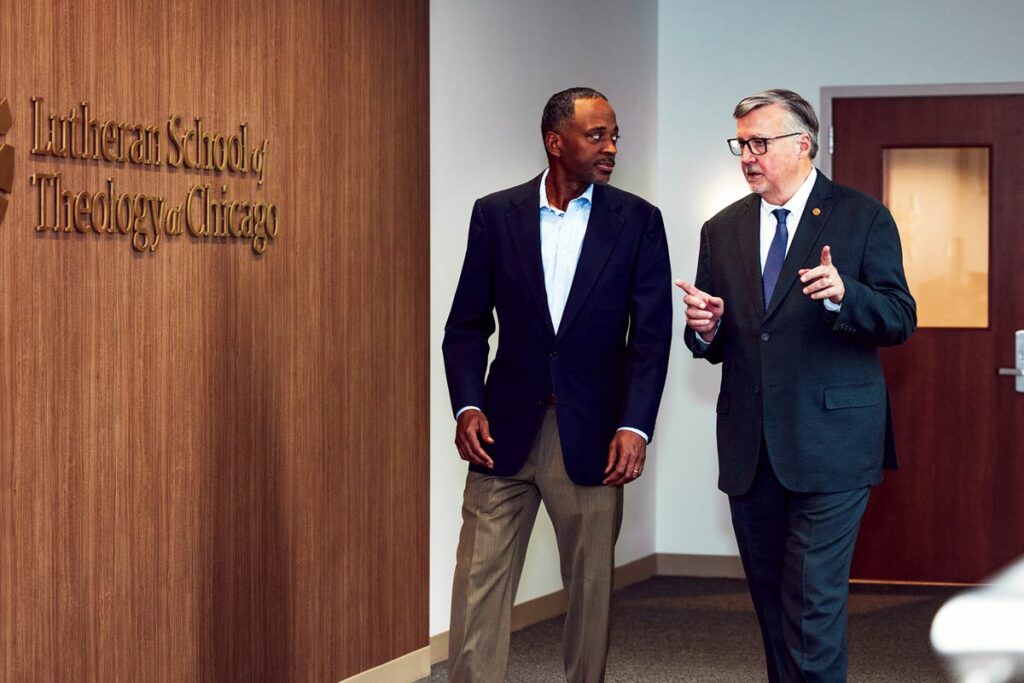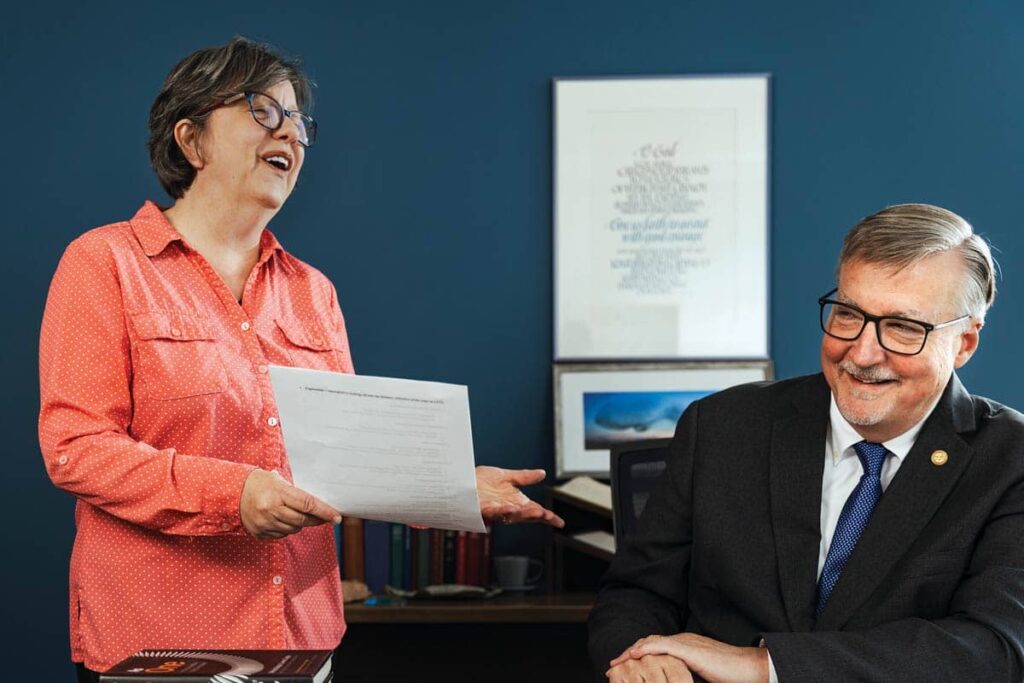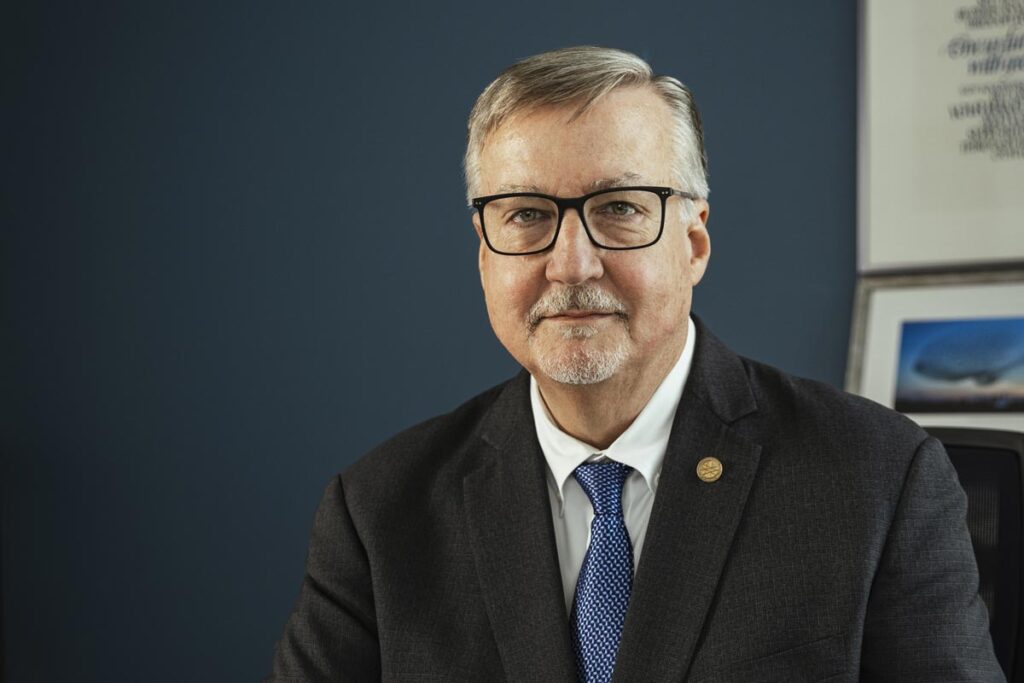Leading LSTC Through a Time of Tremendous Change

In an era of dramatic changes in higher theological education, James Nieman has proven to be a steadfast leader
Since his call to the presidency at the Lutheran School of Theology at Chicago in 2012, Nieman has guided the seminary through financial strain, evolving church dynamics, and a shifting academic landscape. He did so while embracing innovative approaches to governance, education, and strategies for long-term institutional sustainability. For over a dozen years, his thoughtful but decisive leadership has steadied the seminary and created a framework for stability and growth.
Reflecting on the earliest days of his presidency, Nieman recalls, “I faced a school saturated with anxiety and reactivity, so we quickly needed to rebuild a sense of calm, confidence, and care.”
Nieman’s presidency began amid financial uncertainty for LSTC, a challenge faced by seminaries and institutions of higher education across the country. In 2014, the school’s accreditors raised concerns about LSTC’s long-term sustainability and governance structure, and other issues derived from these deficiencies. Nieman responded to their questions with a decade-long strategy dedicated to improving institutional governance, ensuring financial sustainability, elevating institutional branding and committing to adaptability.
Change in Board Governance Structure
One of Nieman’s first steps was to address institutional governance. At the time, the LSTC board of directors needed restructuring to better reflect the diversity and expertise necessary for long-term success. Nieman led efforts to create a leaner, more diverse, engaged, and proactive board—one capable of playing an active role in financial planning, institutional mission and vision, and strategic decision-making.
“It wasn’t enough for our board to be a governing body. They needed to be partners in navigating the future of theological education,” Nieman explained.
Nieman’s restructuring efforts fostered greater unity within the institution, allowed for more flexible and agile institutional planning, and led to a comparable reorganization of staff structures.
Today, LSTC’s board of directors is comprised of 17 members, down from 30. Nearly half of the new board members can be characterized as historically underrepresented, in terms of racial or ethnic identity, gender identity, or sexual orientation.
The Public Church Curriculum and Institutional Rebranding

In addition to addressing structural concerns, Nieman was also focused on reinventing the core of LSTC’s educational mission. His goal was to create a curriculum that spoke directly to the evolving needs of both the church and society.
Nieman was a catalyst for the faculty development of the Public Church curriculum, a groundbreaking masters-level degree program that aimed to equip students not only for familiar congregational ministry but also for public leadership and social engagement. The curriculum, with its emphasis on justice, equity, and public engagement, has become a hallmark of the seminary’s identity.
The Public Church curriculum positions LSTC as a seminary engaged in the pressing social issues of the day and has helped the school stand out in a crowded field of theological institutions. Courses range from a theological examination of systemic racism to the intersections of faith and public life. The scope of courses offered allows students to engage their theological education with a variety of vocational pathways, from congregational leadership to advocacy and public policy.
“LSTC has always equipped people to lead in a changing world,” said Nieman. “What we’ve done with the Public Church curriculum is ensure that our students can engage with the issues of justice and community shaping the future of the church and the world.”
The success of the Public Church curriculum is evident in the students it attracts. The seminary draws students from a wide array of backgrounds, including those passionate about social justice, advocacy, and public ministry.
As part of his broader vision, Nieman led a comprehensive rebranding process, making the Public Church curriculum the cornerstone of LSTC’s identity. The Lutheran School of Theology at Chicago brand reflects the seminary’s mission and its longstanding dedication to the good news of Jesus Christ, social justice, global engagement, and intellectual rigor.
A new brandmark was developed, containing several symbols that together form a unique whole: the world, the many pathways to, through, and beyond LSTC, the cross and the Trinity, openness to new ideas, and the blessing of LSTC’s diverse community.
It embodies the complexity and wholeness of the community, accompanied by the tagline, “Called into the World.” By reimagining the seminary’s mission, vision, values, and core marks, Nieman positioned LSTC uniquely within the theological landscape, strengthening its reputation and attracting a diverse, socially engaged student body.
The Return of Codex 1424: A Defining Moral Moment
In 2016, Nieman and LSTC made international headlines when the seminary returned a rare ninth-century Greek New Testament manuscript to its rightful home at the Monastery of Panagia Eikosiphoinissa near Drama in northern Greece. The manuscript, Codex 1424, was legally acquired by the president of one of the seminary’s predecessor institutions and LSTC had ownership of the document for nearly a century.
The decision to return the manuscript was significant not only for the field of biblical scholarship but also as a moral stance. Nieman and LSTC could have legally kept the manuscript but chose instead to pursue what they believed to be a more ethical course.
At the time of the return, Nieman explained, “We didn’t have to return this book; we wanted to. The desire to live in a reality of grace and peace drove us to do what was right.”
The return of the codex garnered significant attention from scholars and religious leaders around the world. For Nieman, it was a defining moment in his leadership, one that emphasized the importance of moral integrity and justice in LSTC’s mission.
A Moral Seminary
LSTC also made significant strides in addressing issues of race and equity during Nieman’s tenure. Following the Standing Rock Sioux and Dakota Access Pipeline protests, the murder of George Floyd and the subsequent nationwide reckoning around race and policing, LSTC was forced to examine its own structures and practices around diversity, equity, and inclusion.
Under Nieman’s guidance, the seminary appointed a Director of Diversity, Equity, Inclusion, and Justice in 2021, an important step in ensuring that issues of race, gender, and justice remain central to LSTC’s mission.
The DEIJ director, along with the newly formed Antiracism Transformation Team, continue the work of bringing systemic change to the seminary. These efforts include changes in curriculum, hiring practices, and student support, with the goal of fostering a more inclusive and equitable environment for all. LSTC’s commitment to these issues helped the seminary become a more welcoming space for students of color, LGBTQIA+ students and allies, and others from historically marginalized communities.
A Bold Move: Relocating LSTC’s Campus

In 2020, the global pandemic compelled LSTC, like many institutions, to rethink its operations. As the world moved to Zoom and other digital spaces for interaction, the need to maintain a massive physical facility designed decades earlier for in person learners became unnecessary. Consequently, in 2023, LSTC negotiated the sale of its 56-year-old campus and relocated to a shared facility in Hyde Park owned by Catholic Theological Union, later being joined by McCormick Theological Seminary.
The strategic decision to relocate by Nieman and the board of directors was both a practical move of stewardship and one that ensured LSTC’s long-term sustainability. Sharing facilities with peer institutions has not only reduced operational expenses but also fostered a vibrant, ecumenical learning environment.
Emerging from LSTC’s plan to decrease its physical footprint was a plan to expand the seminary’s digital footprint.
President Nieman’s pledge to lead an adaptive seminary has been realized in the form of Project Starling, LSTC’s new asynchronous learning initiative designed to deliver theological resources to a global audience.
The project, championed and named by Nieman in reference to how a murmuration of starlings executes rapid change through close alignment, is set to launch in 2025. Project Starling is another reflection of Nieman’s deep understanding of the changing landscape of education and the church and the evolving role of technology in education. It reflects a deep desire to make theological education more widely available to more kinds of people in ways that are affordable and equitable.
As Nieman concludes his call as president, the full measure of his legacy is clear. His leadership, combined with the collective efforts of LSTC’s staff, faculty, and board, culminated in a major milestone: the reaffirmation of LSTC’s dual accreditation by both the Association of Theological Schools (ATS) and the Higher Learning Commission (HLC) in 2024. This achievement is a testament to the success of Nieman’s decade-long strategy and the institution’s resilience.
Nieman’s retirement will be deeply felt by those who worked alongside him. His legacy goes beyond programs and structures—it is about the culture of faith and purpose he cultivated at LSTC.
“Theological education will always be important because it raises significant questions of meaning, justice, and community, all in light of the good news of Jesus Christ. Our job is to ensure that LSTC remains a place where those questions and faith commitments can be explored in ways that speak to today’s world.”
– James Nieman